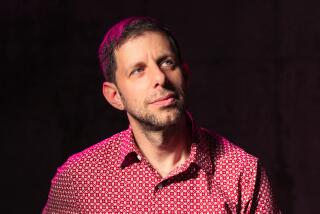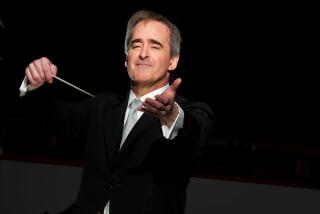TENOR SETH McCOY: TO EXPRESS, NOT IMPRESS
In a career spanning three decades, Seth McCoy has been sustained by a combination of versatility, musicianship and what appears to be an easygoing temperament.
The North Carolina-born tenor, who returns to a Los Angeles stage tonight, appearing in Royce Hall at UCLA with the Pasadena Chamber Orchestra in the title role of Handel’s oratorio, “Jephtha,” attributes his career to serendipity--and a willingness to try the unexpected.
“Some people--especially some conductors--have been confused by my voice,” he says, “so they offer me roles or assignments they wouldn’t normally associate with a tenor of my type.”
The 57-year-old singer is the first to admit he is no heroic or dramatic tenor. “But the weight and body of the voice, especially as it has matured, combined with a certain intensity, have convinced some people that I was right for specific works.”
Consequently, McCoy has found himself singing, on more than one occasion, Florestan in Beethoven’s “Fidelio,” the tenor solos in Verdi’s Requiem and Mahler’s “Lied von der Erde,” and other more-or-less heavy parts.
“The only question,” McCoy explains, during a rehearsal break at Pasadena City College, “is, can I stay vocally healthy while singing these different parts. If the answer is yes, then I have no frustrations.”
Versatility, then, has made McCoy’s repertory broader than it might have been, he says, had he remained in that part of the musical literature that “I was born to sing--Bach and Mozart. But, because the music of those composers is so right, and so natural, for me, they intimidate me more than other composers. And, in their music, I am more self-critical.”
Though the Handel tricentennial is now over, the Handel revival is not, says McCoy.
“And this newest generation of musicians treats Handel much differently than earlier ones did.
“Now, performances are lighter, more transparent, with smaller ensembles than before. And the old, sing-only-what-you-see style has been replaced with genuine ornamentation, many more embellishments.”
By now, McCoy calculates, he has sung the part of Jephtha at least four times, most memorably, he says, under the late Calvin Simmons, with the Oakland Symphony, in 1980.
“I’ve not sung an uncut ‘Jeph-tha’--and this one, at UCLA, won’t be complete, either,” the tenor volunteers, explaining that one of his three arias has been excised for the Royce Hall performance.
“I don’t really mind,” he offers. “Handel did sometimes go on. He could be very good about repeating himself.”
As a Handel specialist, McCoy says there can be problems when one changes editions. Or when one performs with modern instruments one time, with original instruments (tuned lower than their 20th-Century counterparts) another.
“It sounds strange, but when I last sang ‘Theodora,’ with an original-instrument band, that silly half step-down really threw me. Singing in the lower key should have been no problem, but it felt like completely different music.”
Still, McCoy believes, the important thing in musical performance is “to put all the preparation, the rehearsals, the research and scholarship, behind you. When I go out onto the stage, I am there to express, not to impress.
“Before the performance, I do everything I can to prepare myself. I read, I study, I rehearse and I make decisions. But when I walk on, I’m there to give the audience an experience, to let them go away with something, to make the music live.”
More to Read
The biggest entertainment stories
Get our big stories about Hollywood, film, television, music, arts, culture and more right in your inbox as soon as they publish.
You may occasionally receive promotional content from the Los Angeles Times.










